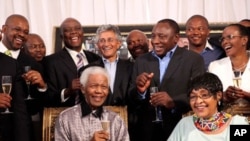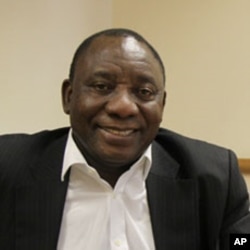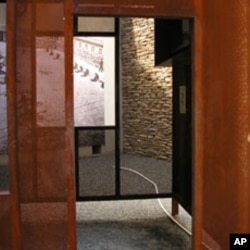South Africans are observing the 20-year anniversary since the country's elder statesman Nelson Mandela walked free from an apartheid prison. The anniversary is being marked with a symbolic march from the prison, speeches, and exhibits at museums.
It was a day few South Africans expected to see, Nelson Mandela walking down the road a free man and hand-in-hand with his then wife, Winnie Mandela. He emerged to a rapturous crowd outside the Victor Verster prison not far from Cape Town, with millions across the country and the globe watching the event live on television.
There had been some debate among his ANC handlers that day about where he should make his first address, with many believing it should be in his home town of Soweto. Jay Naidoo, then general secretary of the Congress of South African Trade Unions, tells VOA that Mandela chose otherwise.
"And at the end of all of this debate which he listened very closely to he said, I have been in Cape Town for 27 years, this is the place which has been my home for that 27 years, I will make my first address to the nation here. And that was the end of the debate," he said.
And so in the fading light of February 11, 1990, Mr. Mandela came on to the balcony of Cape Town's city hall, and addressed the excited, massed crowd. He reminded them of his words from the dock in the 1964 trial for sabotage in which he was sentenced to life behind bars.
"I have fought against white domination, and I have fought against black domination. I have cherished the ideal of a democratic and free society in which all persons live together in harmony and with equal opportunities. It is an ideal which I hope to live for and to achieve. But if need be, it is an ideal for which I am prepared to die," said Mr. Mandela.
The manner of arriving at the decision that day seems to typify Mr. Mandela's style of leadership. He listens to all sides of a discussion, but then makes up his own mind. But Cyril Ramaphosa, then chairman of the Nelson Mandela Reception Committee, says the former South African president easily brings others around to his point of view.
Ramaphosa tells VOA that he was part of a delegation that was permitted to meet the jailed leader a few months before his release. Mr. Mandela had begun talks with government leaders and this made leaders of the African National Congress and black trade unions very uncomfortable.
"We knew that he had started talking to the enemy, and we were going there to tell him to stop this talking to the enemy business, and no sooner had we been in his presence than our resolve melted, it just disappeared because we were in awe, literally in awe of him," said Ramaphosa.
Mac Maharaj, currently President Jacob Zuma's special envoy, spent twelve years behind bars with Mr. Mandela. He tells VOA of an incident in prison on Robben Island which he says illustrates another aspect of Mr. Mandela's leadership.
The political prisoners were being marched, in rows of four, to work in the limestone quarry, and the guards shouted that they should run. Maharaj says Mr. Mandela told his fellow prisoners to slow right down and quietly moved to the front to set the pace and ensure they did so, despite their fear of a violent reprisal.
"Mandela has a very awkward walk, but I think that day it was the slowest walk of his life," he said. "That demonstrated to me, the epitome of his leadership, he is always ready to take the risk that he asks any of his comrades to take. He is always ready to assess a situation, and understand what it demands, and bend his conduct both his word and his behavior, to suit those needs."
The three decades he had been behind bars, his image and voice outlawed by the apartheid government, had forged Mr. Mandela into a myth for most. But Ramaphosa, Mr. Mandela's chief negotiator in the country's democracy talks and the principal architect of South Africa's widely acclaimed constitution, says that on meeting him, myth quickly merged into man.
"His stature, his mere presence, and that is when I thought that myth and man merged, to be the Nelson Mandela that we finally saw in our presence. A man of unbelievable resolve; resolve that you picked up as you shook his hand, as you looked straight in his eyes, and as he talked to you," he said.
In 1994 after his African National Congress party won an overwhelming victory in the country's first democratic elections, Mr. Mandela became South Africa's first black president. Many promises were made by him and his party to right the wrongs of the past, to give black South Africans equal opportunity, equal education, equal health care, decent homes and jobs - millions of jobs.
There has been remarkable progress in some areas, but there have also been real failures, particularly in the past ten years.
A significant black middle class has emerged, and a number of black South Africans are now counted among the country's most wealthy. Blacks are making a significant impact, not only in government posts, but in all sectors of the economy.
But while most children now go to school, many schools are failing to give them a good education; many clinics were built in rural areas, but often they are not staffed or not equipped, and the country is reeling under the burden of the highest prevalence of HIV/AIDS in the world.
South Africans also live under a burden of a very high crime rate, with some 50 reported murders each day and equally high numbers of other violent crimes such as rape and assault.
There are daily reports of corruption at all levels of government. And perceptions of a government beset by corruption were not helped by a seven year corruption investigation against President Jacob Zuma, which was abandoned shortly before the election which brought him to power last year.
But perhaps most importantly the economy, which grew well up until the global economic collapse in 2008, has failed to deliver the number of jobs needed to make a significant impact on the levels of poverty. The official jobless rate is 24 percent, and a recent study revealed the country has the widest gap between rich and poor in the world.
Nobel peace laureate Desmond Tutu, who remains one of the country's moral lodestars, says it is time for South Africans to recapture the spirit that prevailed when Mr. Mandela was released and to start making a difference in bringing the fruits of democracy to all South Africans.






